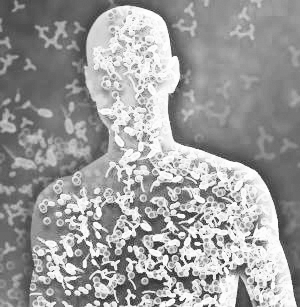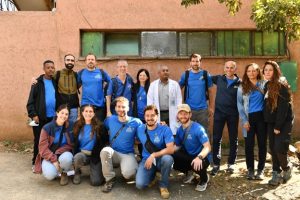
Ecosystem is vital for the existence of all living and none living things which include, human beings animals, plants, water, soil etc .
If the ecosystem is endangered, the whole life cycle will be disturbed. Because of this preserving and protecting microbes which serve as a base for the existence of all system is essential,said Dr Genene Tefera the Director of the Directorate of Micro Organism at the Ethiopian Biodiversity Institute.
As to him, microorganisms were there even before the creation of the world but because of various factors, for many years they have been facing challenges which left them on the brink of extinctions.
As they are invisible, it is impossible to reckon and to tell their initial amount on earth and to confirm the damage inflicted on microorganisms.
Like animals and plants they could not be detected by a naked eye. Because of this, it is impossible to tell whether they are annihilated or not in a given period of time. However, indirectly it is possible to surmise whether they have suffered damage or not . For example, when a species perishes similarly microbes in that area will be affected and destroyed.
But their great natural ability is that they could change their forms through permutation and adopt the environment .This makes them unique from other species.
According to Genene, science has proved that microorganisms are created earlier than other creatures and it is they that laid the foundation for the existence of the latter.
They managed to reach to the current level through evolution and adoption to the environment. The changing behavior of microbes has not yet be known thoroughly in the world let alone in our country. The preservation and identification works are done in alignment with the benefit they afford particularly on their role in accelerating the growth of plants. The identified and isolated microbes help get results after the laboratory test.
From the health perspective microbes can be used as an input to produce antibiotics helpful to prevent diseases. They also serve as catalyst in the industrial production process and used as yeasts in traditional and modern bread baking.
According to Genene, currently to substitute the imported yeast, whose cost is a strain on the nation’s meager currency, by local production, efforts are underway. Scientific studies have also proved that microbes can break down plastics, other used materials and industrial inks into small particles. The directorate has envisaged that after a while through molecular experiment they will be utilized for various purposes.
In general, science has proved that almost 99 percent of microbes have economic values and only 1 percent of them are vectors. The vectors pose diseases in their bid of struggling for survive by making their living in the host organisms .Sometimes they support the host organism for mutual benefit. This behavior is their natural means of survival.
The human being metabolic system proves this. When the chewed up food gets into the big intestine via the esophagus, it is further broken down in to small pieces by microbes. These microbes support humans through mutual benefit. That is why the Ethiopian Biodiversity institute preserve and isolate microbes by their species types. After they are isolated as per their demand for them, they will be provided to stakeholders.
As to Genene, though the microorganisms’ biodiversity is isolated and sequenced, they will not be patented or no one could claim the right to ownership. Plant and animal species preservation work is not patented but the search to knowledge and new findings could be patented.
The Microorganism Directorate prioritizes the gathering, isolation and preservation work. Then after study will take place on their behavior and delivered to stakeholders. Currently, universities are getting microorganism species from the Ethiopian Biodiversity Institute for their research and development work.
Similarly, the pharmaceutical industries will take microbes and make scientific researches to prove whether microbes have a capacity to kill diseases or not.
Preparation is underway that, in the long run, those microbes which are preserved in the institute to be supplied to the market. As to Genene, his directorate not simply resorts to research whenever forest areas or ecosystems are damaged. Rather it devotes its time and energy on specific areas for research.
For example, Algae and spiral are bacterials and whenever the biodiversity is damaged they are also harmed. Because of this, the preservation work will be carried out. But with regard to supplying microbes to stakeholders it will be done based on the demand. Pertinent institutions such as pharmaceutical industries, health institutions and environmental protection authorities will be provided with microbes upon request.
As mentioned above microorganisms by their nature play a crucial role in advancing plants’ growth. In some Teff growing areas it was experimented and showed results. To scale up the practice, the Directorate of microorganism is working in collaboration with the Debrezeit Agricultural Research Institute.
PHD students also prepare their dissertation focusing on the positive impact of microbes on fertilizing soil in the mentioned areas. It is planned that, in the future with the support of donors the disseminating task of research outcome to farmers will be made a point of.
To implement things through pilot programs molecular studies and sequencing are being carried out. The conventional inorganic fertilizers which are used by farmers such as nitrogen, phosphate and potassium provide very little minerals to the plants but they badly damage the environment.
Therefore, to protect the environment and to accelerate plant growth, utilizing microorganisms, which are organic elements, is recommendable. In sum, Ethiopia aspires to step up agricultural productivity. Using inorganic fertilizer much has been achieved. But still very little attention is paid to the damage inflicted on the environment by the manmade fertilizer. Hence, scaling up the utilization of organic fertilizer got from microorganisms is essential.
The Ethiopian herald June 7,2020
ABEBE WOLDE GIORGIS





